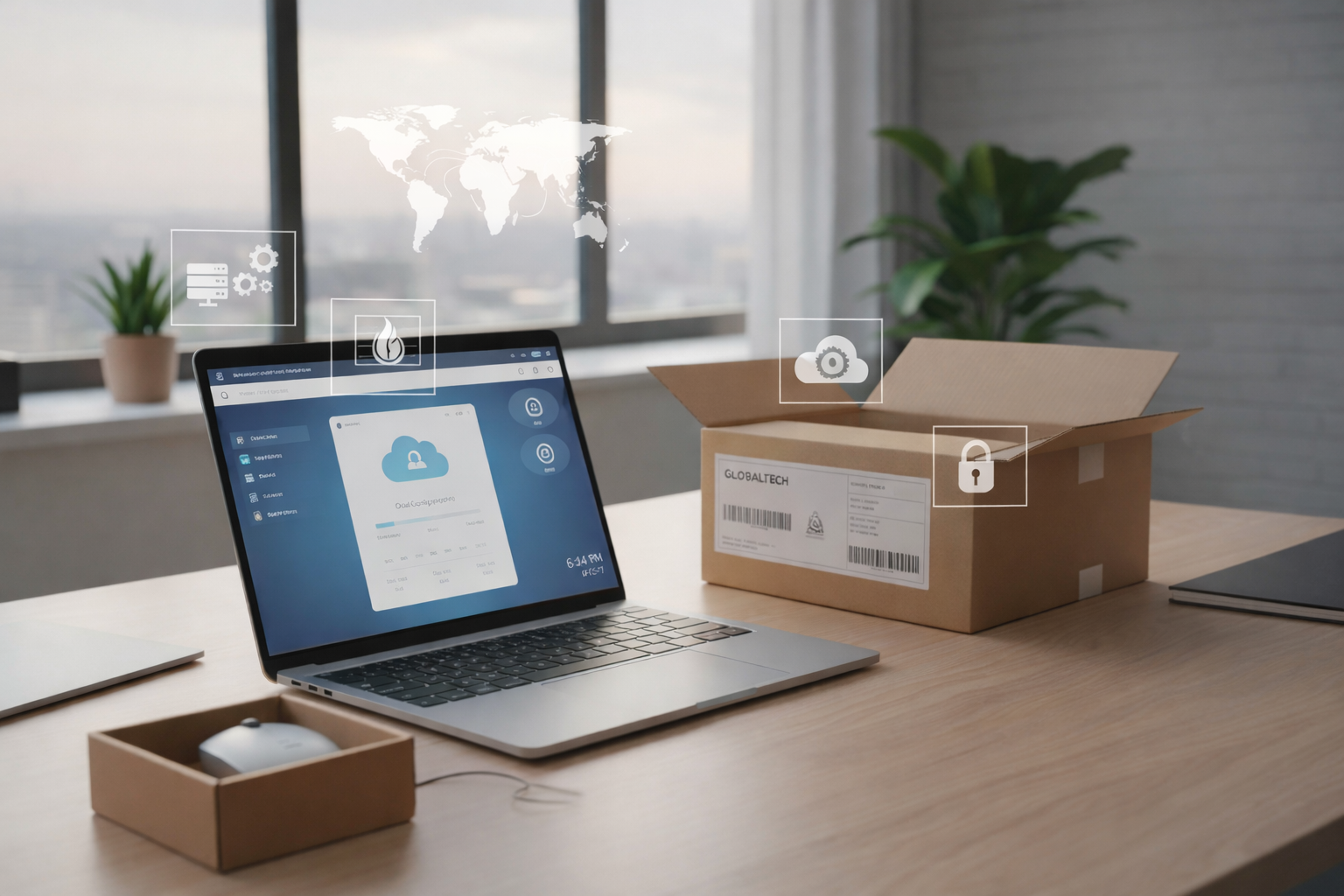As global companies expand their operations, tapping into the globe’s vast talent pool has become a strategic priority. According to Economics Times, amongst all potential Tech labor markets, India is an attractive investment, with a 40% net employment projection for early 2025, leading globally.
However, with such widespread operation, comes the need for international hardware shipment, and fundamentally, laptops.
To effectively onboard remote employees in India, companies must navigate the complexities of shipping laptops from the USA, ensuring compliance with regulations and efficient delivery.
Understanding regulations for corporate laptop shipping

Customs regulations in India
Shipping laptops from the United States to India involves adhering to strict customs procedures. Laptops are classified under HS Code 8471, which determines their applicable duties and taxes.
To ensure smooth processing, companies must provide accurate product descriptions, including the make, model, and value of the shipped laptops. Incorrect or incomplete information can result in customs delays, additional charges, or even shipment rejections.
It’s also important to understand that India’s customs authorities scrutinize corporate shipments to confirm compliance with local laws. Proper laptop classification and accurate valuation on the commercial invoice can help avoid unnecessary complications.
Commercial documentation required
Companies must include a commercial invoice with all shipments, detailing the specifications of the laptops, their purpose (e.g., corporate equipment), and their declared value.
Additionally, a packing list should outline the contents of the shipment, including the number of devices, their serial numbers, and any accessories included.
For international shipments, including the necessary documentation upfront simplifies customs clearance. Missing or incomplete paperwork can lead to delays or even penalties.
It’s advisable to work with a shipping service that offers expertise in handling such corporate requirements.
Battery regulations
Since laptops are equipped with lithium-ion batteries, they fall under specific international shipping regulations. These batteries are classified as dangerous goods due to their potential fire risk. To comply with safety standards, companies must ensure proper packaging and labeling.
Use materials such as bubble wrap and tamper-proof packaging to cushion the batteries and prevent damage during transit. Carriers like FedEx, DHL, and UPS provide guidelines for shipping lithium-ion batteries, which include restrictions on the quantity and placement of batteries in a package. Following these rules is essential to avoid shipment rejections or safety issues.
Employee responsibilities
When laptops are shipped directly to employees in India, it’s critical to establish clear communication about their responsibilities. Employees should:
- Be available to receive the package and ensure timely delivery.
- Inspect the laptop upon receipt to confirm there is no damage or missing components.
- Familiarize themselves with any customs procedures, such as providing identification or signing for the shipment.
Setting clear expectations with employees helps streamline the delivery process and avoids potential misunderstandings or delays.
Cost of shipping laptops to India for businesses
Courier fees
The cost of shipping a laptop internationally varies based on factors such as the courier service chosen, package weight and dimensions, and the desired delivery speed. For a standard laptop shipment from the USA to India, businesses can expect the following approximate costs:
- UPS: $180–$220, with a delivery time of 3–5 business days.
- FedEx: $200–$250, with a delivery time of 3–5 business days.
These estimates are based on typical services offered by major couriers. Actual prices may vary depending on specific shipment details and any additional services required.
Customs duties and taxes in India
Importing laptops into India incurs Goods and Services Tax (GST) and other applicable import duties. The standard GST rate on laptops is 18%, but additional charges may apply based on the declared value and HS Code classification.
Businesses can sometimes claim input tax credits for GST paid on imported laptops, reducing the overall tax burden. To ensure compliance and avoid unexpected costs, companies must accurately declare the laptop’s value and purpose in the commercial invoice.
Packaging and insurance costs
Proper packaging is crucial to ensure the laptop’s safe arrival. While some couriers offer specialized laptop shipping boxes, businesses can also purchase packaging materials separately. The cost for packaging materials, including a sturdy box, bubble wrap, and cushioning, typically ranges from $10 to $20.
Given the high value of laptops, investing in shipping insurance is advisable. Insurance costs are generally calculated as a percentage of the item’s declared value. For instance, insuring a laptop valued at $1,000 might cost between $10 and $20, depending on the courier’s rates and the level of coverage selected.
Hidden costs to watch for
While planning for shipping costs, businesses must be aware of potential hidden expenses, including:
- Delays and warehousing fees: Customs clearance delays can lead to storage charges.
- Additional handling fees: Some couriers charge extra for shipments requiring special handling, such as those with lithium-ion batteries.
- Non-compliance penalties: Failing to meet customs or shipping regulations can result in fines or rejected shipments.
By understanding and planning for these potential costs, businesses can avoid unpleasant surprises and ensure a smooth shipping experience.
Step-by-step corporate shipping process
Shipping laptops internationally, especially to a country like India, requires meticulous planning and execution. Below is a step-by-step guide for businesses to follow:

1. Select a reliable courier service
Choose a trusted courier with expertise in international shipments to India, such as FedEx, UPS, or DHL. Consider factors like delivery times, tracking capabilities, and customer support.
2. Prepare necessary documentation
Compile all required documents, including:
- Commercial invoice: Provide details of the laptops, their declared value, and purpose.
- Packing list: List the number of devices, accessories, and package contents.
- Any additional documents required by customs, such as an import-export license.
3. Ensure compliance with regulations
Verify that your shipment meets India’s customs requirements and international shipping regulations, especially for laptops with lithium-ion batteries.
4. Package the laptops securely
Use high-quality packaging materials to protect the laptops. Wrap each device in bubble wrap, secure them with foam padding, and use a sturdy outer box. Clearly label the package with the recipient’s details and the note: “Corporate Equipment – Not for Resale.”
5. Arrange for insurance
Protect your shipment with comprehensive insurance to cover loss, theft, or damage. Review the coverage terms to ensure it aligns with your needs.
6. Ship the laptops
Book your shipment with the chosen courier service, ensuring that all required details, such as recipient information and delivery address, are accurate. Select the shipping method—express or standard—based on your timeline and budget.
7. Track the shipment in real time
Monitor the shipment’s progress using the courier’s real-time tracking tools. This helps you stay informed about the delivery timeline and address any potential issues proactively.
8. Confirm delivery
Once the laptops are delivered, confirm receipt with the recipient. Request that employees inspect the laptops for any damage or missing accessories immediately.
Selecting the right shipping method for corporate needs
Express vs. standard shipping
When shipping laptops internationally, businesses often face a choice between express and standard shipping:
- Express shipping: Offers faster delivery times, typically within 2-5 business days. This option is ideal for urgent requirements, such as onboarding new employees quickly. However, it comes with higher costs.
- Standard shipping: A more cost-effective option with delivery times ranging from 7-15 business days. Suitable for non-urgent shipments or bulk deliveries where time is less critical.
Businesses should weigh factors like delivery timelines, budget constraints, and employee onboarding schedules to determine the best shipping method.
Corporate partnerships with couriers
Establishing corporate accounts with major couriers like FedEx, UPS, and DHL can provide several benefits, including:
- Discounted rates for bulk shipments.
- Priority handling and faster resolution of issues.
- Dedicated account management for streamlined communication.
Such partnerships are particularly beneficial for businesses with frequent international shipments.
Door-to-door vs. centralized delivery
Companies can choose between two main delivery methods:
- Door-to-door delivery: Laptops are shipped directly to employees. This method is convenient for remote employees but may incur higher costs due to decentralized logistics.
- Centralized delivery: Laptops are sent to a regional office or distribution center before being handed out to employees. This option is cost-effective for larger shipments but requires additional local coordination.
Customs brokerage services
Navigating customs procedures can be complex, especially in countries like India. Partnering with a customs brokerage service can simplify the process by:
- Ensuring accurate documentation and compliance.
- Expediting customs clearance.
- Managing communication with customs officials.
This service reduces the risk of delays and ensures shipments reach their destination on time.
Packaging and preparing laptops for corporate shipping
Standardized packaging guidelines for companies
Proper packaging is critical to protecting laptops during transit. Follow these guidelines:
- Use tamper-proof and shock-resistant packaging.
- Wrap laptops individually in bubble wrap and place them in foam-padded boxes.
- Use sturdy outer boxes to prevent damage during handling.
- Label the packages clearly with employee details and company branding for easy identification.
Customs labeling requirements
Accurate labeling helps expedite customs clearance. Ensure packages are marked with:
- “Corporate Equipment – Not for Resale” to indicate the shipment’s purpose.
- Detailed product descriptions, including serial numbers, to align with customs regulations.
This transparency minimizes the likelihood of delays or disputes during customs inspections.
Pre-shipping configuration
Pre-configuring laptops ensures employees can start working immediately upon receipt. This includes:
- Installing company-specific software and applications.
- Configuring security settings, such as antivirus programs and VPN access.
- Updating the operating system to the latest version.
Pre-configured devices not only save time but also enhance security.
Shipping accessories and peripherals
When shipping laptops, it’s important to include essential accessories like:
- Chargers: To ensure employees can use the laptops without delay.
- Docking stations or peripherals: Useful for specific roles requiring additional hardware.
Carefully package accessories to prevent damage and include them in the customs packing list.
Common challenges in corporate laptop shipping & how to overcome
Customs delays
Challenge: Customs delays are a common hurdle in international shipping, often caused by incomplete documentation, incorrect HS Code classification, or regulatory non-compliance.
Solution:
- Ensure all required documents, such as the commercial invoice and packing list, are complete and accurate.
- Verify the correct HS Code (8471) is used for laptops and accessories.
- Partner with a customs brokerage service to streamline clearance and avoid missteps.
- Monitor shipments using real-time tracking to identify and address delays promptly.
Lost or damaged shipments
Challenge: Laptops can be lost or damaged during transit due to improper handling, inadequate packaging, or theft.
Solution:
- Use tamper-proof, shock-resistant packaging with ample cushioning, like bubble wrap and foam inserts.
- Opt for comprehensive insurance coverage to safeguard against financial loss.
- Choose reputable courier services with robust safety measures and reliable tracking systems.
Employee onboarding delays
Challenge: Late delivery of laptops can disrupt employee onboarding schedules, affecting productivity and morale.
Solution:
- Plan shipments well in advance, accounting for potential delays in transit or customs.
- Use express shipping for urgent needs to minimize downtime.
- Maintain a small inventory of pre-configured laptops locally to address immediate requirements.
Regulatory missteps
Challenge: Misunderstanding or overlooking regulations, such as lithium-ion battery shipping rules or customs compliance, can lead to shipment rejection or penalties.
Solution:
- Stay informed about battery regulations and safety standards for international shipments.
- Clearly label shipments with accurate details, including “Corporate Equipment – Not for Resale.”
- Work with courier services experienced in handling international shipments and regulatory compliance.
Esevel – The smarter alternative for shipping all your IT essentials
Shipping laptops internationally, particularly from the USA to India, involves navigating complex logistics, regulatory requirements, and potential challenges. If it’s a handful for your distributed team, you can consider outsourcing this process to full-scope IT services like Esevel.
Esevel provides a comprehensive IT management platform designed to streamline the entire process:
- Device procurement and delivery: Esevel handles global hardware sourcing and delivery to over 88 countries, ensuring devices reach employees on time and in perfect condition.
- Real-time tracking and support: Monitor shipments and resolve issues quickly with Esevel’s IT support.
- Pre-shipping configuration: Devices are pre-configured with company software and security settings, ready for immediate use upon delivery.
- Global hardware support: Esevel ensures minimal downtime with repair services and loaner devices for employees worldwide.
5 frequently asked questions (FAQs)
1. What is the best way to ship a laptop from the USA to India?
The best method is to use a reputable courier service like FedEx, UPS, or DHL. This will ensure compliance with customs regulations, ensure the laptop is packaged securely, and include all required documentation.
Or if you’re shipping laptops for remote employees or business operations, Esevel can handle device procurement, secure shipping, and IT setup across multiple locations, simplifying the process.
2. What are the customs duties on laptops imported to India?
Customs duties include an 18% GST on laptops and any applicable import duties based on the declared value. Accurate documentation helps avoid unexpected charges.
3. Can lithium-ion batteries be shipped internationally?
Yes, but they must comply with international safety standards. Proper packaging and labeling are essential to prevent shipment rejection or delays.
4. How can I ensure laptops are delivered safely to employees in India?
To ensure laptops are delivered safely and on time, we use tamper-proof, shock-resistant packaging, comprehensive insurance, and real-time tracking.
5. How does Esevel help with IT equipment management?
Esevel simplifies IT operations with services like global hardware procurement, pre-shipping configuration, device tracking, and real-time IT support, ensuring efficient delivery and seamless employee onboarding.







